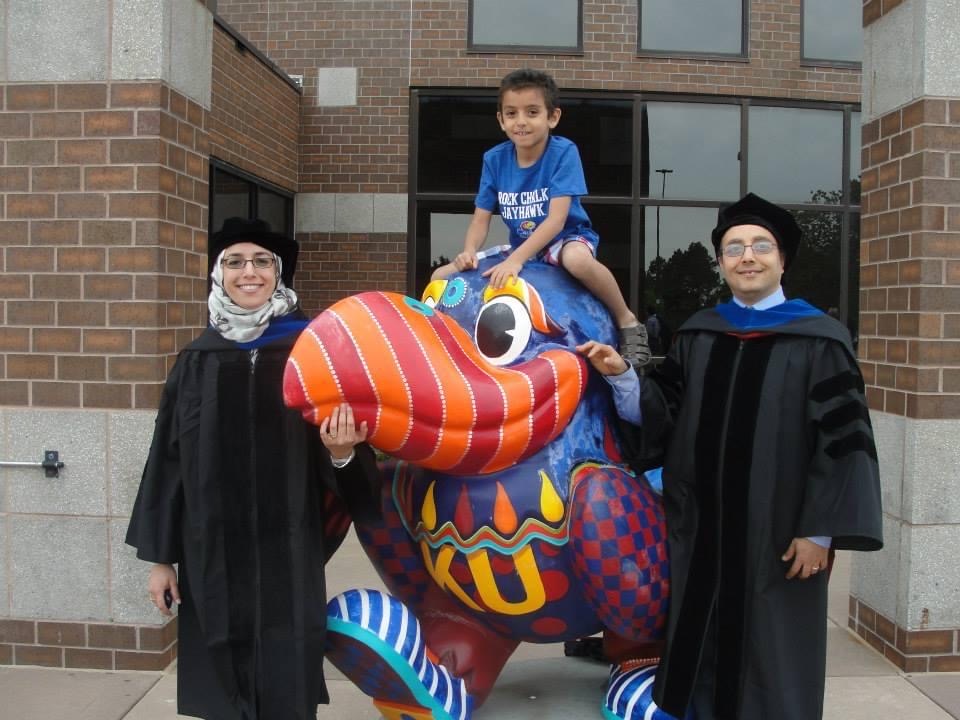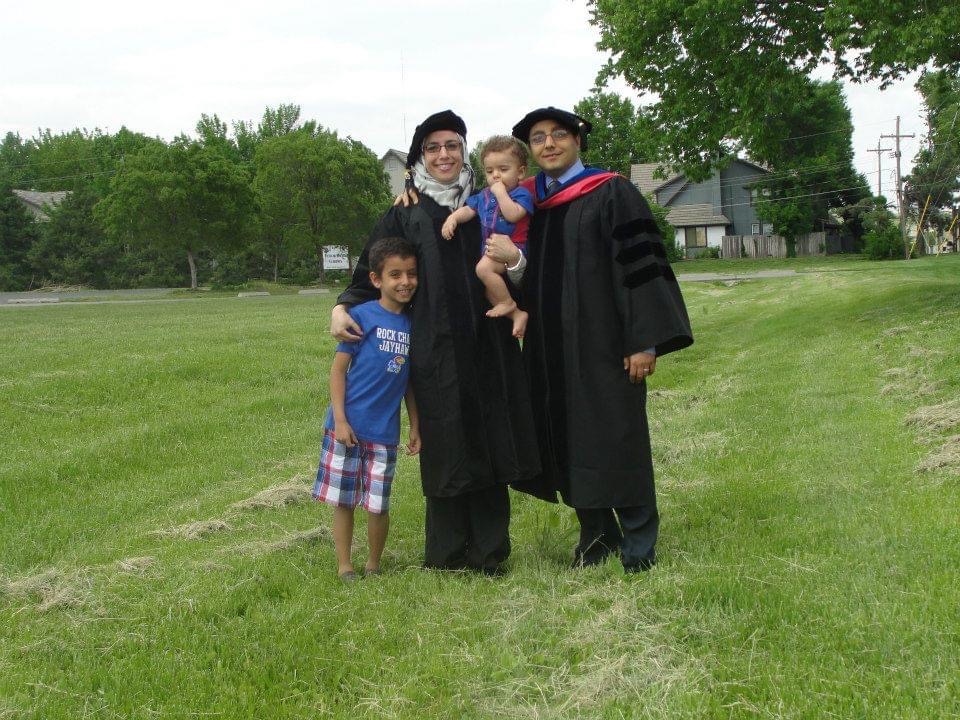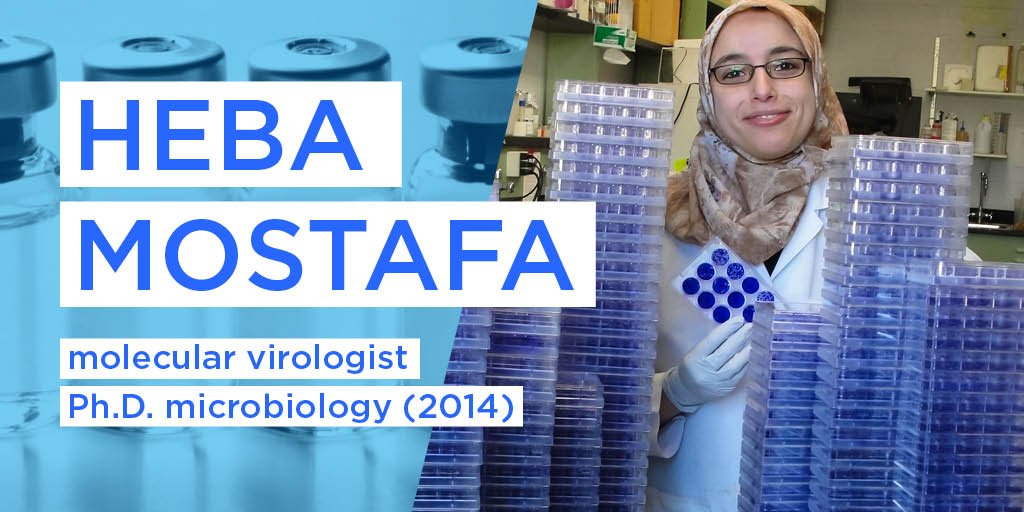
Why Heba’s a Hawk to Watch:
When the COVID-19 pandemic hit in early 2020, KU community members across the globe joined forces to curb the disease’s spread and provide relief to communities in need, showing the world what’s possible when Jayhawks rise to major challenges. One of these Jayhawks, Heba Mostafa, who earned a doctorate in microbiology in 2014, made national and international headlines this spring for her efforts to develop quick, reliable testing for the virus — innovative work that put the research and technical skills she sharpened at KU to the test in the most consequential ways imaginable.
Since the first wave of the pandemic, Heba and her team at Johns Hopkins Hospital have been collaborating with scientific leaders to increase the availability and efficiency of testing for COVID-19. In just a few months, they have tested more than 150,000 samples, catching 12,000 positive cases in the process. It’s been an unpredictable and at times difficult year, Heba admits. But with plenty of hands-on training and extensive research experience under her belt, she’s been well-prepared for any professional obstacle that’s thrown her way.
Get to know Heba, our newest Hawk to Watch. See what she had to say about relocating from Egypt to the Sunflower State, what people should know about the virus, and the value of teamwork during “extraordinary circumstances.”
Tell us in a sentence or two what you do for a living:
I am the director of the Molecular Virology Laboratory at Johns Hopkins Hospital and an Assistant Professor of Pathology at Johns Hopkins School of Medicine.
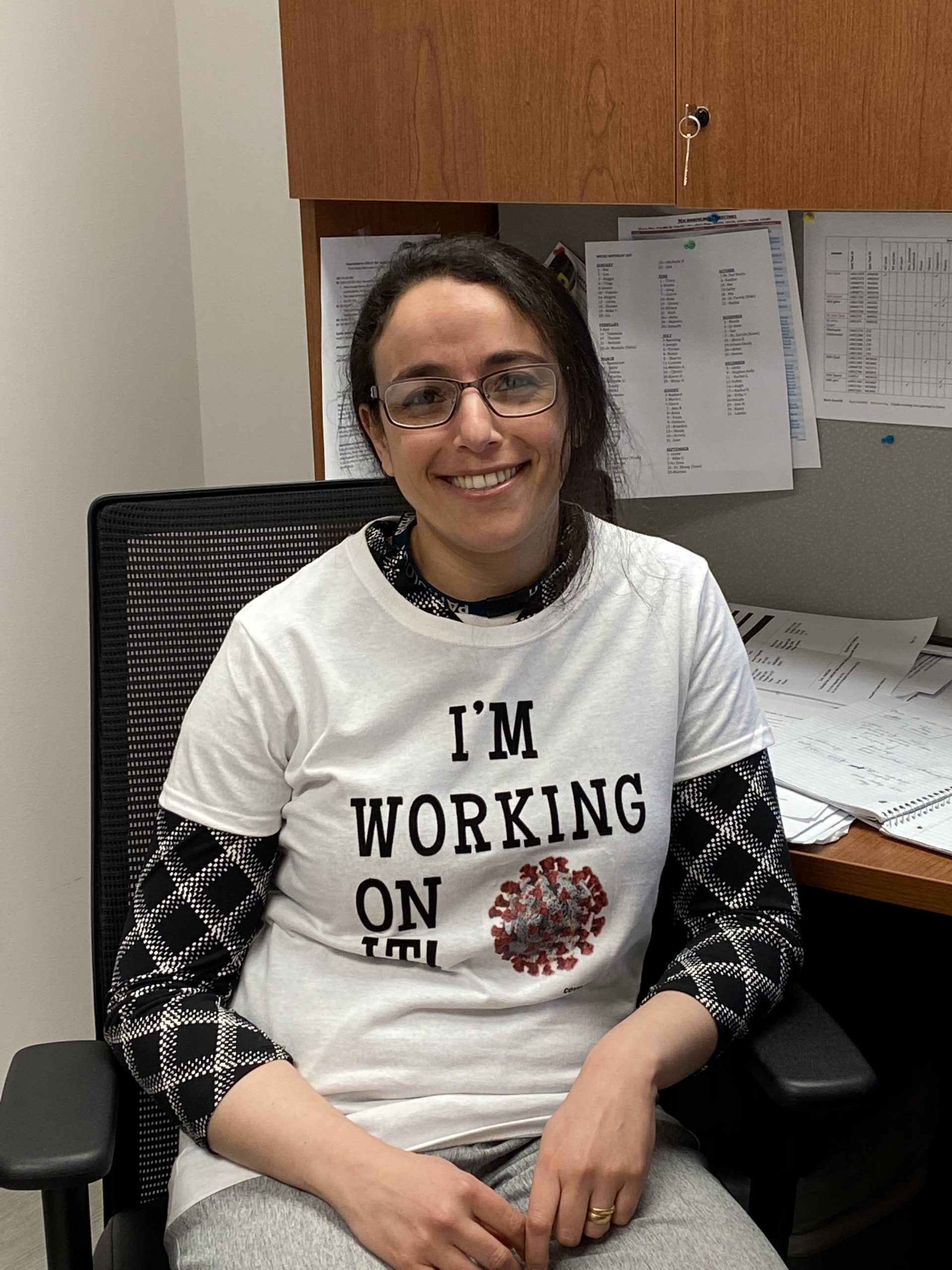
How did you end up doing what you do?
It was a long but exciting and enjoyable journey. I earned a medical degree from the faculty of Medicine, Alexandria, Egypt. I realized really early in my career that I am most interested in microbiology and started my Master’s degree and residency in clinical pathology. I moved to the US to join my husband as he started his PhD at the University of Kansas and I got accepted in the microbiology program in the same department. I earned my PhD after 5 years of hard work. I then moved to Memphis, TN for a post-doctoral research fellowship at St. Jude Children’s Research Hospital.
At the end of the three years, I realized I need to find a career that allows me to combine my medical and research interests, background, and expertise. I then applied to the CPEP medical microbiology fellowship program and got accepted at the URMC program, Rochester, NY, where I completed my fellowship in two years, followed by the American Board of Medical Microbiology Exam and certification. I then was offered the position of the director of the Molecular Virology Laboratory at Johns Hopkins Medicine.
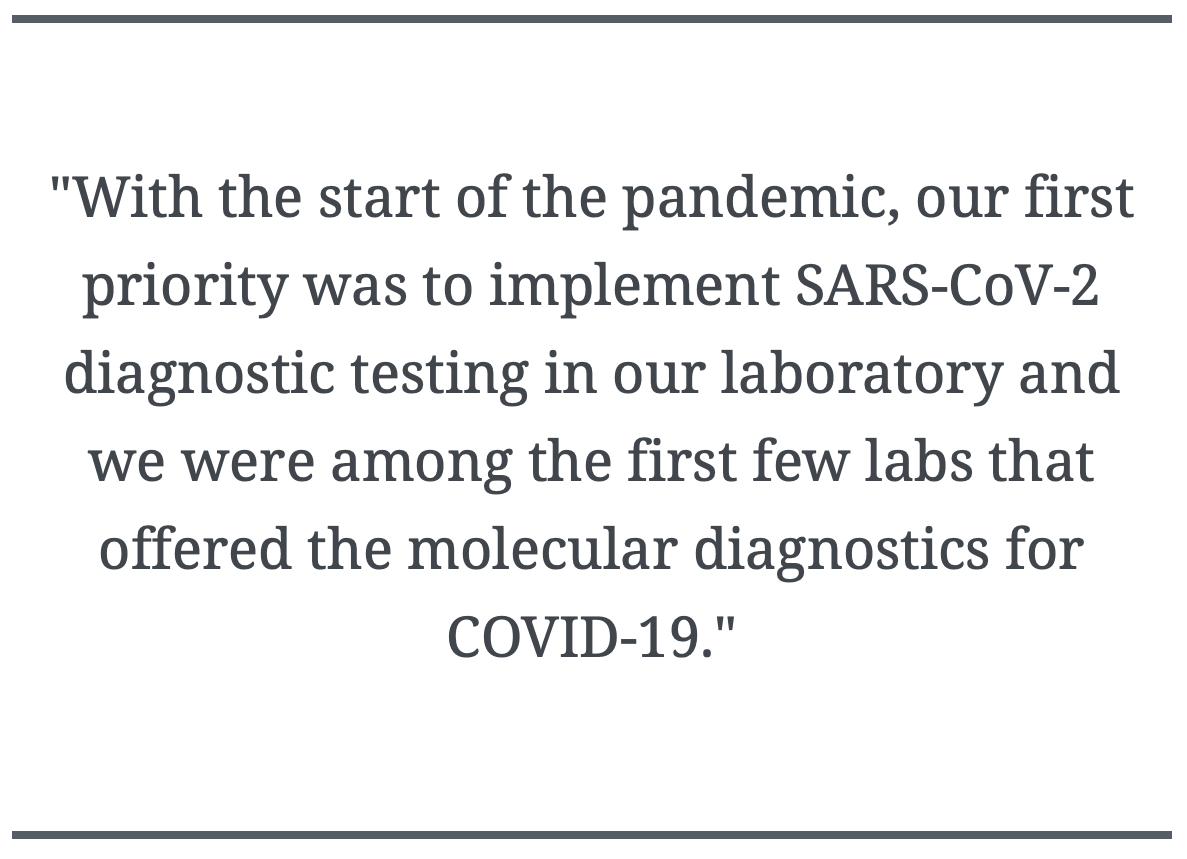
How has your day-to-day life and work changed since the start of the COVID-19 pandemic?
With the start of the pandemic, our first priority was to implement SARS-CoV-2 diagnostic testing in our laboratory and we were among the first few labs that offered the molecular diagnostics for COVID-19. We put a lot of effort to expand testing and overcome challenges of supply chain issues. We validated nine different assays to build redundancy to assist with the high testing volumes and shortages in supplies. We assisted testing for Hopkins Hospital system, multiple local and community hospitals and practices, community screening, and research. We so far tested more than 150,000 specimens and diagnosed about 12,000 positives.
Alongside the clinical diagnosis, I initiated SARS-CoV-2 whole genome sequencing in the clinical laboratory for epidemiological surveillance and to answer plenty of research-based questions. I also initiated multiple research projects that answered questions related to diagnostic assays’ performance, understanding prolonged viral shedding, correlating viral polymorphisms with disease severity, among others.
The pandemic experience has been very challenging but exceptionally rewarding. I have gained a lot of experience leading an amazing team under extraordinary circumstances. I got to work and collaborate with experts inside and outside Hopkins and exchange experiences with leaders in the field. Although the pandemic was associated with major disruption on all levels, it was associated with unprecedented learning opportunity and an exceptionally unique teamworking environment that brought the best from each and all of us.
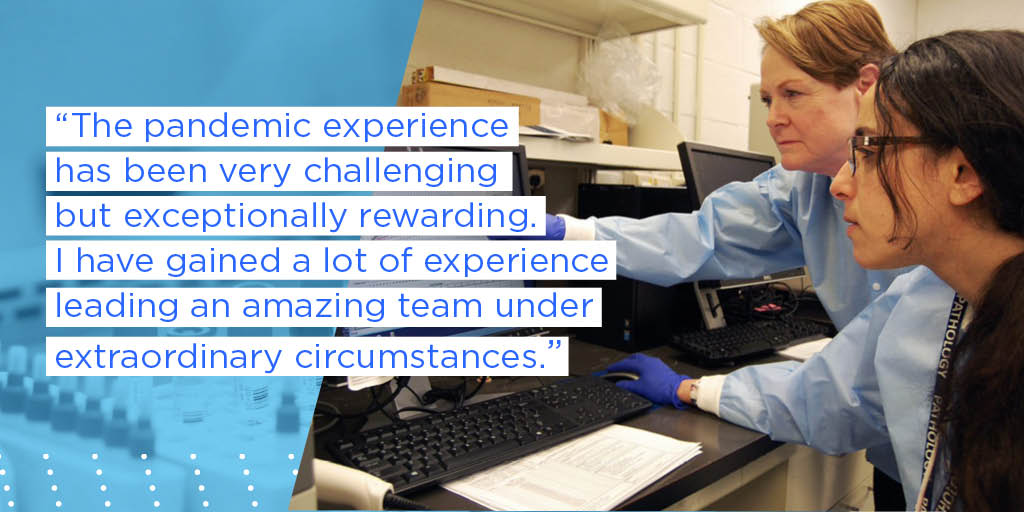
What do you think people should know about the coronavirus and its spread that they might not already?
The disease affects all ages and can be severe in healthy people. Please take all the necessary precautions until efficient preventive measures become available.
What developments do you hope to see in the near future in terms of efforts to combat the spread of the coronavirus? What do you think the timeline looks like?
The vaccine is our way out of this, or of course an effective and specific treatment. The vaccine timeline might vary but trials are progressing quickly. We should be cautiously optimistic but we shouldn’t rush bringing a vaccine to the market until safety and efficacy are fully elucidated.
How did your KU degree prepare you for your current job?
My KU degree prepared me for both my research and my CPEP clinical microbiology fellowships. It provided me with the basic knowledge, research and technical skills, troubleshooting skills, and plenty of published research articles that shaped my career. I would like to take the chance to thank my mentor Dr. David Davido, and all the members of my committee by names: Dr. Susan Egan, Dr. Kristi Neufeld, Dr. Scott Hefty, Dr. Steve Benedict, and Dr. Tom Yankee. Along with many other Jayhawks who supported me.
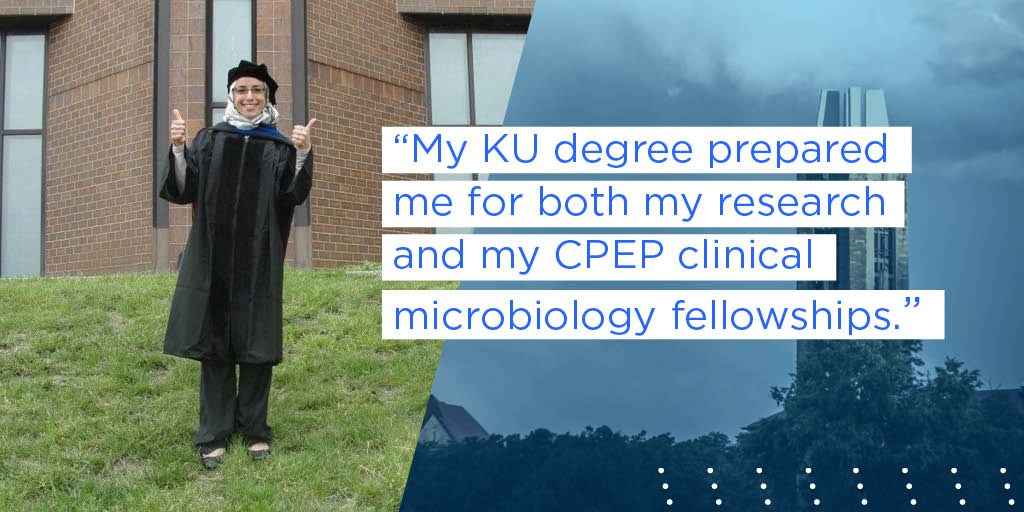
What do you know now that you wish you could tell your 18-year-old self?
I would have told the 18-year-old Heba that there are non-conventional career pathways, and to explore and talk to experienced people.
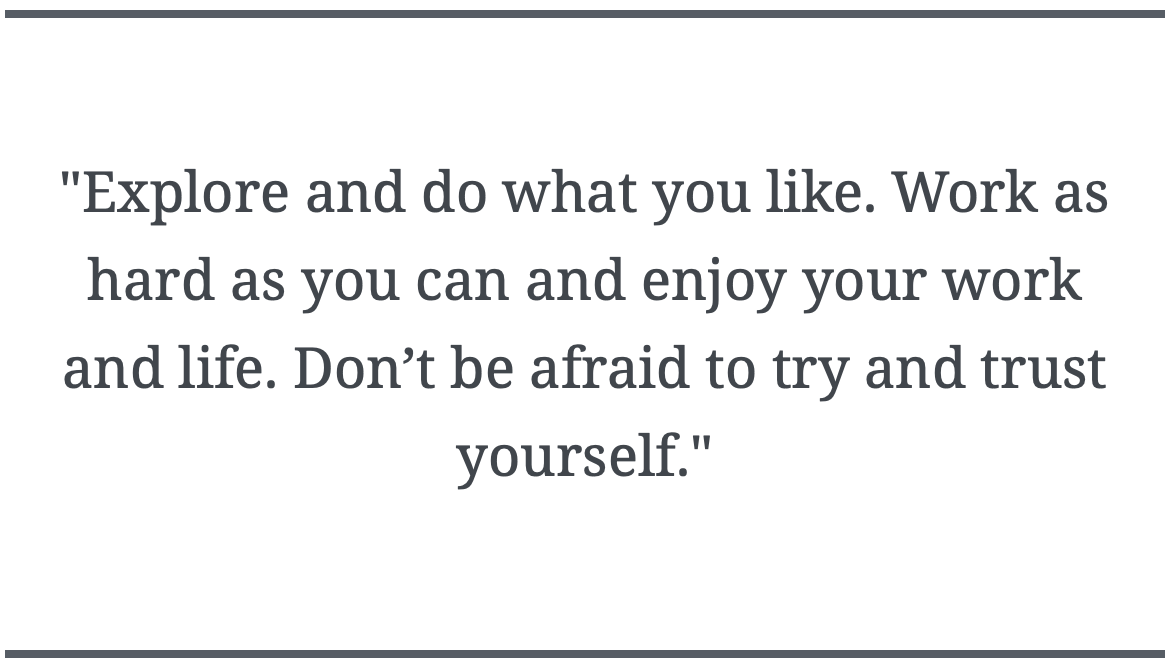
Where do you hope to be in 10 years?
I hope to be a full professor leading a state-of-the-art molecular diagnostic lab and an outstanding researcher.
What’s your best career pro-tip?
Explore and do what you like. Work as hard as you can and enjoy your work and life. Don’t be afraid to try and trust yourself. And on top of everything, time is very valuable and runs faster than we think, so what can be done in one minute shouldn’t take more than one minute. Lost time can’t be restored unfortunately.
What do you do after you’ve clocked out?
I spend the time with my kids and my husband.
What is a fun fact about you that surprises people?
I love singing and I am good at it!! Singing is my alternative career plan.
Meet more of our Hawks to Watch. For more information, visit the Department of Molecular Biosciences at the University of Kansas, Johns Hopkins School of Medicine, and Johns Hopkins Hospital.
Hawks to Watch are disrupters. They’re poised for greatness, inspiring their colleagues and excelling in their professions. Basically, they’re killing it. Having recently graduated, they are just starting to leave their mark and we can’t wait to see how their story unfolds. These Jayhawks span all industries including business, non-profits, tech, healthcare, media, law and the arts.
